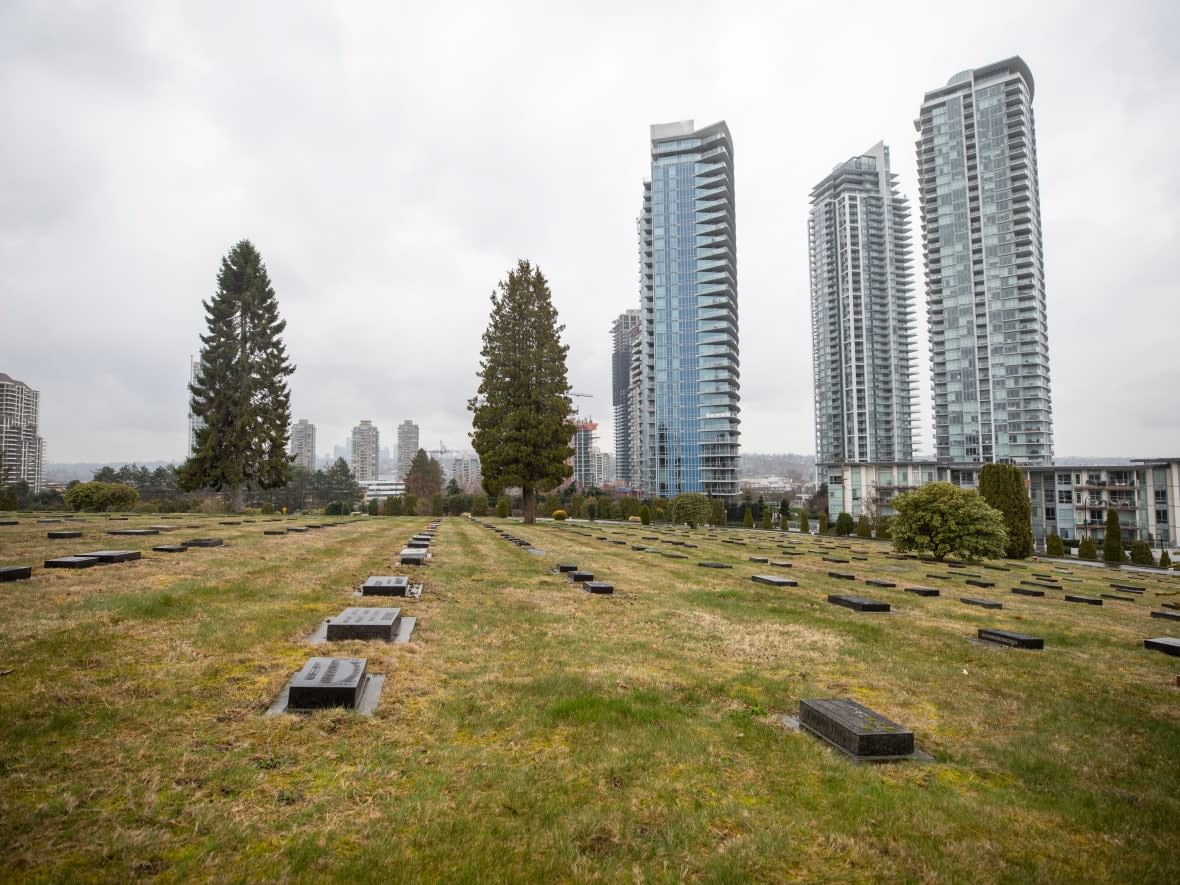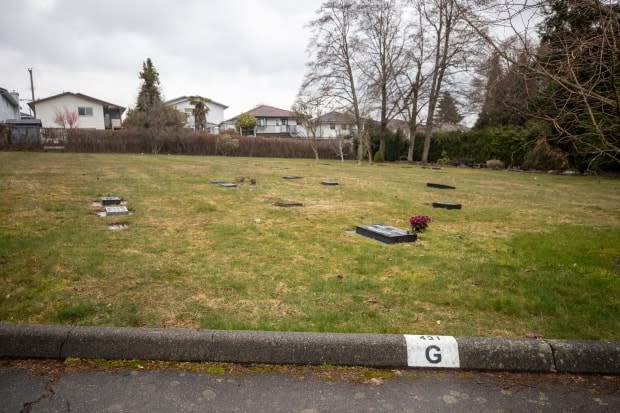Widow's battle to resell burial space underscores Metro Vancouver's real estate crunch

A little more than 25 years ago, John Douglas Carnahan bought the rights to two burial plots in the northeast corner of a hilly cemetery in a dense area of Burnaby, B.C.
Back then, they cost $750 each.
As years passed and space grew scarce, the cost of a single plot in the same cemetery surged to more than $10,000.
After Carnahan's death at 91, his widow decided not to use the plots. Her battle for the right to sell the plots privately to any buyer at market value has now spilled over into B.C. Supreme Court in a case experts say again proves the region's real estate crunch is also squeezing its graveyards.
"We are running out of space, particularly in the Lower Mainland," said architect Bill Pechet, who's worked in cemetery design for roughly 30 years.
"Just like we have a housing crisis for the living, we're also encountering a housing crisis for those who want to be buried."
Cemetery blocking resale, widow says
Carnahan bought both plots at Pacific Heritage Cemetery in March 1998. At the time, there was a clause in the purchase agreement saying cemetery directors "may" buy back owner's plots at the original purchase price.
Carnahan's widow, Sheila Carnahan, contacted the cemetery after her husband's death in 2021 to ask how she could go about privately selling the plots she no longer needed to a third-party buyer.
Her claim said staff told her in an email last October that, according to its bylaws, she could only sell her plots back to the cemetery for the original purchase price of $750 each.

Sheila Carnahan has argued the cemetery "misinterpreted" its own bylaws because the clause said cemetery directors "may purchase" plots back — not "must purchase."
"The claimants say that the position taken by the [cemetery], while invalid in law, effectively prevents a sale to third parties because the [cemetery] controls the ownership record and the operation of the cemetery, including the preparation of the grave for use," the lawsuit said.
"The [cemetery] could effectively prevent the new owner from using the plot."
The cemetery has not responded to her claim in court.
In B.C., rights to internment sold in perpetuity
In B.C., buying a plot is just buying the right to internment, meaning a buyer is paying for the right to be buried in the space but not purchasing the land itself. Those rights are sold in perpetuity, so buyers can hold plots for however long they choose — unless a plot has been empty for more than 50 years and the rightsholder is more than 90 years old, in which case a cemetery can launch the complex process of applying to get the space back.
Each cemetery sets its own rules around resales. Some bylaws allow private sales, others don't.
Most cemeteries in Metro Vancouver are full or nearly full. As the value of real estate has skyrocketed over the last decade, so has the value of that scarce burial space — especially in urban areas. Private plots in Metro Vancouver have been listed on Craigslist or Kijiji for anywhere from $5,000 to $50,000.
Resales are common enough to warrant caution from Consumer Protection B.C., urging buyers to check online ads carefully to ensure whether cemeteries honour private sales.
Limited space, poor planning part of the problem
There's a shortage of traditional cemetery space in B.C. for the same reason there's a shortage of space for new homes — builders have nowhere else to go.
"The housing crisis that we're encountering is a result of our inability to expand horizontally because we encounter the mountains on one side and the ocean on the other," said Pechet.
"We have a land shortage for housing, and cemetery spaces are a form of housing."
City planning was also an issue.
"For some reason, the Metro Vancouver area seems to have significantly less cemetery space through some planning than most other municipalities," said Glen Hodges, who manages Mountain View Cemetery, the only graveyard in Vancouver.
"It's some magical mystery as to why."
Some European countries, like Switzerland, Sweden, Italy, France and Germany, limit cemetery leases to anywhere between three and 30 years to free up more plots.
In Spain and the United Kingdom, bones can be moved after a certain period so the plot can be recycled to be sold again. The City of London Cemetery, for example, reuses graves left untouched after 75 years.
In 2019, the City of Vancouver passed a series of bylaws to save space at its only cemetery. Gravesites at Mountain View Cemetery are now allowed to be shared by multiple families, and the cemetery can decide when additional remains can be added to an existing space.
Pechet said B.C. might have to consider vertical cemeteries, like those in Japan, or find a way to tactfully incorporate gravesites into existing public parks. Recycling could also be an option.
"I think it will inevitably have to lead to a lot of invention," he said.


